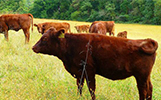| Shrinking Water Footprint of Canadian Beef Production
Beef Research | December 14, 2017
Canada's beef industry has dramatically reduced its water footprint over the past several decades, and that trend is expected to continue, a new study has found.
The amount of water required to produce one kilogram of Canadian beef has decreased by 17% from 1981 to 2011, due largely to enhanced efficiency in how feed crops for beef cattle are produced, as well as enhanced efficiency in raising beef cattle and producing more beef per animal.
There have been a couple articles recently on the subject of whether grass finished or grain finished beef is better in terms of carbon footprint and another article (PDF) suggesting that the US beef industry should reduce the area of land used (both grassland and land for feed production) to improve environmental performance. Suffice it to say that agricultural systems are complicated.
Pretending that making a change in one area is going to be positive without looking at the knock on effects on the whole system is dishonest. We know that 86% of feed to produce meat is non–human edible. We know that by–products such as distillers grains have value as livestock feed and that grain markets are buffered by livestock. We know that grasslands have a hugely important role in sequestering carbon and preserving biodiversity. The paper below is not presenting anything very new, but it also looks at only one aspect of sustainability, which as we know has to be defined holistically.
There is very definitely a role for grass finished beef as there is for cattle finished on feed. Pitting one part of the industry against the other can only detract from the whole, and splitting sustainability into silos can only detract from our efforts to make the whole beef industry more sustainable.
Raising Beef Cattle On Grass Can Create a Higher Carbon Footprint Than Feedlots, New Study Suggests
Kimberly Hickok, Mongabay | December 5, 2017
The popularity of grass–fed beef owes much to the claim that the meat from cattle raised on pastures is superior to corn–fed beef. Many people may feel better knowing they just ate meat from an animal that spent its life on a picturesque green pasture, rather than packed into a dreary prison–like feedlot.
But would those people still feel good about their choice if raising grass–fed cattle actually turned out to be worse for the environment? A new study suggests that might be the case.
The team concluded that placing cattle in feedlots, where they eat corn–based feed for at least the last few months before slaughter, greatly decreases the carbon footprint of beef production. Cattle reared this way produce more meat per animal, on average, and they need less space compared to purely pasture–raised, grass–fed cattle.
Look at these figures for ranch returns on investing in sustainability in Brazil.
Sustainable Practices Lead to Corporate Profits 
Andrea Murad, Global Finance | December 11, 2017
Tensie Whelan, director of the Center for Sustainable Business at New York University's Stern School of Business, talks about the growing bottom–line case for sustainable practices.
Whelan: We looked at beef in Brazil and the commitments to deforestation–free and sustainable agriculture. Through the uptake, particularly of sustainable agriculture, ranchers saw a 2.3 times increase in productivity, a sevenfold increase in profitability, and the [proportion of] quality beef went from zero to 70%.
Small ranchers saw their income go up millions, which was significant. And those benefits accrued up the supply chain. Slaughterhouses had less volatility in their supply and higher–quality supply. They had less reputational risk because of potential scandals like expired beef or deforestation concerns. We monetized sustainability benefits for the retailers buying the beef: McDonald's and Carrefour.
We often talk about telling the stories of beef production. While some people may be willing to listen, the story only has meaning when it is proven to be true. Irish consumers are no different to those in any other country. Bord Bia is rolling out their Origin Green programme throughout the country to ensure that they have the facts to prove their story.
Consumers Don't Want to Be Told Irish Food Is Sustainable; They Need Proof 
Seán Cummins, Agriland | December 4, 2017
Consumers don't want to be told that Irish food is sustainable, they need proof, a senior figure at the Department of Agriculture told the Food Wise Conference 2017 earlier today.
Bill Callanan, chief inspector with the department, said: "Sustainability is one of the key themes of the Food Wise 2025 strategy and it recognised that environmental sustainability and economic sustainability are equal and complementary; one can not be achieved without the other."
Identifying some the strengths and challenges facing the Irish agricultural sector, the department chief said that pasture–based livestock systems are recognised as being very efficient.
Resistance to Antibiotics: The Good, the Bad and the Ugly 
Baher Kamal, Inter Press Service | December 6, 2017
The use of antimicrobials in healthy animals to prevent diseases has now become common in husbandry systems where large numbers are housed under moderate to poor hygienic conditions without appropriate biosafety measures in place. Similarly, when a few members of a flock have a disease, sometimes all animals are treated to prevent its spread.
Besides such uses for treatment (therapeutic) and prevention (prophylactic uses), antimicrobials have been added — in low dosages– to animal feed to promote faster growth, FAO warns, adding that "although more and more countries prohibit the use of antimicrobials as growth promoters, it remains common in many parts of the world."
Although the UN agency does not say explicitly why this happens, it could be easily deduced that it is due to the voracious appetite for greater profits.
FAO goes on to warns that in the coming decades, the use of antimicrobials in animal production and health will likely rise as a result of economic expansion, a growing global population, and higher demand for animal–sourced foods. Indeed, their use in livestock is expected to double within 20 years.
"It is likely that the excessive use of antimicrobials in livestock (and aquaculture) will contaminate the environment and contribute to a rise of resistant microorganisms. This poses a threat not only to human health, but also to animal health, animal welfare, and sustainable livestock production — and this has implications for food security and people's livelihoods."
Just like the Irish story above; if you can't prove it's sustainable, people probably won't believe you.
A Green Marketing "Wild West": Greenwashing in the Beef Sector 
Jonathan Gelbard, Ph.D, Triple Pundit (blog) | December 14, 2017
As a grassland scientist and sustainable business advisor, I've been working for years to help define sustainable beef production and develop incentives for ranchers, farmers and other supply chain stakeholders. What I've learned during this journey is that while there are exciting advances occurring in the beef sector, sustainability marketing is a Wild West of (mostly unintentional) greenwash.
The language on beef retailer and producer websites often features vague, unsubstantiated sustainability–related claims. This results in confusion about what these claims mean in terms of measurable, verifiable benefits for the health of ecosystems, people, and livestock. | |
